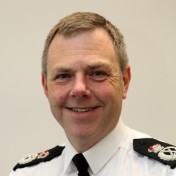Welcome from Simon Prince
As the National Policing Lead for Rural and Wildlife Crime my role is to give guidance and direction on the development of policing services, akin to the two areas of responsibility, to all police forces in England and Wales.

As the National Policing Lead for Rural and Wildlife Crime my role is to give guidance and direction on the development of policing services, akin to the two areas of responsibility, to all police forces in England and Wales.
Wildlife crime is catered for with the National Wildlife Crime Unit playing a major role in standardising investigations and linking up many partnerships with various other law enforcement agencies and Non-Government Organisations. Rural crime, however, is difficult to define hence the portfolio has to look closely at this area of policing not just as a crime issue but more broadly as ‘rural affairs.’
Rural based crime and issues that can affect rural life has many anomalies to urban crime. Although the categories of crimes are the same e.g. theft, burglary, drugs etc. their impacts on rural communities can be far reaching. A burglary in a town of 20,000 people may only impact on a small percentage of that community. The same burglary in a village of 200 people, however, can impact on all the residents. Replicate this in every hamlet, village and small market town in England and Wales and you can quickly see how important it is for policing to get it right. Building the trust and raising confidence in our rural communities is paramount for rural policing to have the desired impact. We need to listen, take action, tackle, disrupt and prevent crime and anti-social behaviour in our rural communities. Although crime rates are falling we must strive to bring offenders to justice and by working better and smarter with our rural communities we can achieve this.
The National Rural Crime Network can assist operational policing in achieving our goals. It can listen to and speak on behalf of the rural communities ensuring that on the ground policing is tackling the important issues, however small they may seem to others. By highlighting the issues, it can influence the guidance and direction taken in rural policing. By working with the College of Policing, we can collectively develop working programmes and Authorised Professional Practices that can deliver the appropriate service to our rural communities.
I look forward to working alongside the NRCN.
